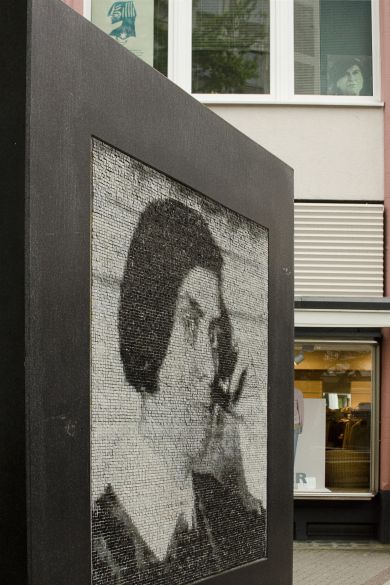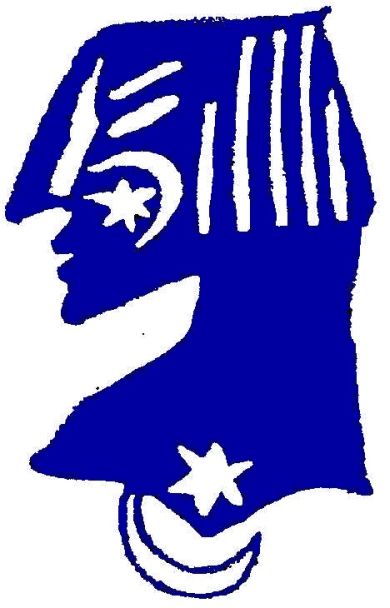Else Lasker-Schüler Society and Foundation “Burned and banned writers – in favour of a centre for persecuted arts”
Else-Lasker-Schüler-Gesellschaft
Herzogstraße 4242103 Wuppertal
- +49 202 30 51 98
- hajo.jahn@else-lasker-schueler-gesellschaft.de
- http://www.else-lasker-schueler-gesellschaft.de
- Hajo Jahn
Else Lasker-Schüler Society and Foundation “Burned and banned writers – in favour of a centre for persecuted arts”
 The memorial remembers the exiled Else Lasker-Schüler in her hometown of Wuppertal. Her biography is like a metaphor for the persecution of artists in the Nazi era: her books were censored and burned, her plays banned and her drawings confiscated from the Nationalgalerie in Berlin in 1937 as “degenerate” art. Many composers who had set her verse to music, such as Paul Hindemith, fled into exile. In exile in Switzerland, Else Lasker-Schüler was banned from writing, in 1939 was denied re-entry and in Palestine could not speak the local language.© Antje Zeis-Loi
The memorial remembers the exiled Else Lasker-Schüler in her hometown of Wuppertal. Her biography is like a metaphor for the persecution of artists in the Nazi era: her books were censored and burned, her plays banned and her drawings confiscated from the Nationalgalerie in Berlin in 1937 as “degenerate” art. Many composers who had set her verse to music, such as Paul Hindemith, fled into exile. In exile in Switzerland, Else Lasker-Schüler was banned from writing, in 1939 was denied re-entry and in Palestine could not speak the local language.© Antje Zeis-Loi
www.exil-archiv.de is a communication and information platform on the subjects of censorship, burning and banning of books, persecution and emigration of writers, artists, scientists and others active in the creation of culture. It is a virtual centre for persecuted arts. An initiative of the Else Lasker-Schüler-Gesellschaft in cooperation with the PEN Zentrum deutschsprachiger Autoren im Ausland (Exile PEN) and the result of an appeal signed by more than 50 writers from Germany and Israel, including Herta Müller, Günter Grass, Wolf Biermann, Sarah Kirsch and Yehuda Amichaui. The website functions as an online magazine that employs scientific, literary (essays, poetry, diaries, novels) and journalistic formats (incl. in the original languages) to illuminate historical events and connections and report on current cases of censorship and persecution of intellectuals worldwide. The aim is to continually expand the exile archive as a virtual platform for documentation, education, publication and research.
The internet portal, which was set up in early 2004, is also a great resource for teachers and students and is committed to promoting historical memory in the service of tolerance and human dignity. The portal aims to involve contemporary witnesses and younger generations in an interactive collaboration to help shape the website and become authors themselves. A special range of materials and instruction units for schools initiated by the Else Lasker-Schüler-(Literatur-)Gesellschaft und -stiftung in cooperation with the Bonn-based organisation Schulen ans Netz e.V., has existed since 2001 at www.exil-club.de.
In early 2006, another new component was added to the exile archive: together with the exiled Iranian writer Dr. Sam Vaseghi, the art and literature of exiled Iranian writers and artists such as Sharnush Parsipur/USA, Robab Mohab/Sweden and Mansour Koushan/Norway have been documented in the multi-language Iranian archive since that time. Censored and/or banned books are thus made available to the public. In addition to biographical information and bibliographies, the archive contains encrypted PDF files of the works. Beginning in 2007, initial steps were taken to establish a network of well-regarded publishers in the Iranian archive.
The exile archive internet portal is a joint project: a virtual centre for persecuted arts by the Else Lasker-Schüler-Stiftung und Verbrannte und verbannte Dichter/Künstler and the Kunstmuseum Solingen. The partners of the exile archive are the Institut für Germanistik II at the University of Hamburg, Aktion Courage/SOS Rassismus (Berlin/Bonn) and the Guernica-Gesellschaft/Karlsruhe.
The exile archive is currently supporting the Belarus Free Theatre in Minsk and is cooperating with the memorial book project for the victims of Nazism at the University of Vienna. In addition to pages in English, French, Spanish, Czech and Farsi, there are also Polish and Hebrew versions on the foreign language portal, highlighting the international character of the project.
www.exil-archiv.de
www.exil-zentrum.de
www.else-lasker-schueler-gesellschaft.de
www.kunstmuseum-solingen.de
- +49 202 30 51 98
- hajo.jahn@else-lasker-schueler-gesellschaft.de
- http://www.else-lasker-schueler-gesellschaft.de
- Hajo Jahn

